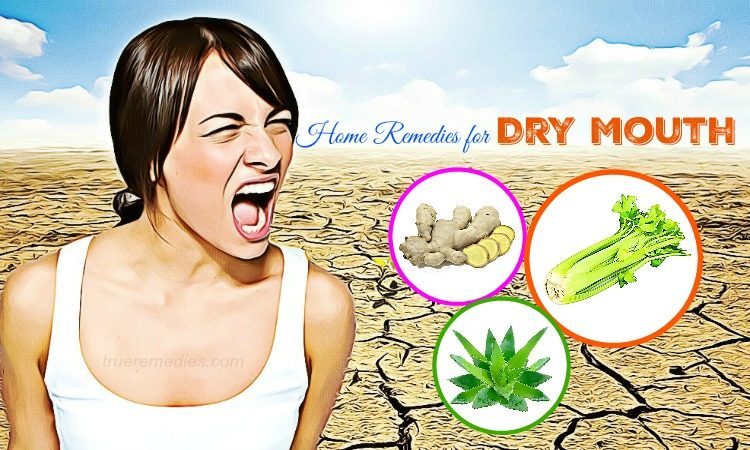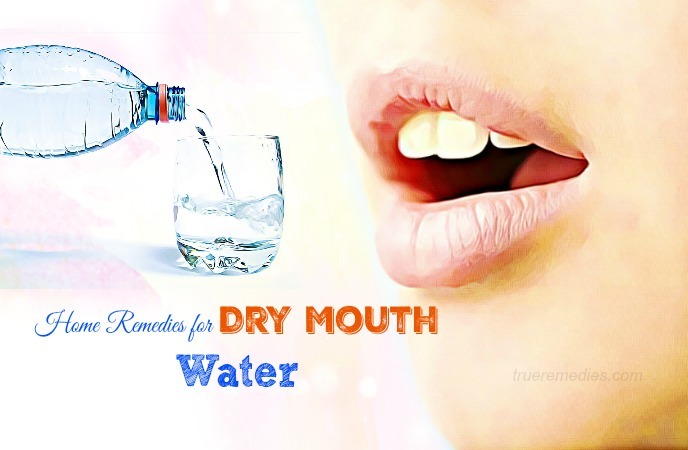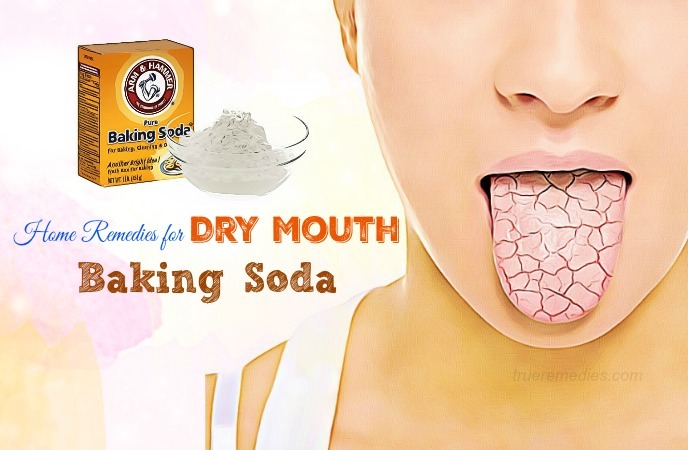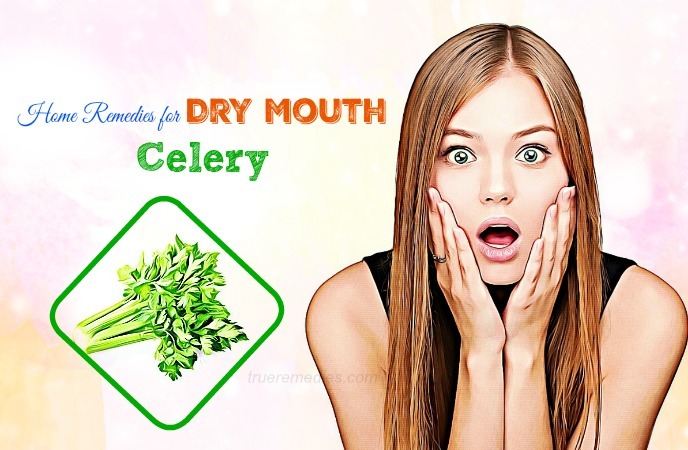updated: 11/14/2019
CONTENTS
Dry mouth is a disease or a symptom of other diseases. About 10% of the population with dry mouth get a lot of troublesome. Dry mouth is a common side effect associated with drug therapy. This problem also causes bad breath as one of the reasons for the examination. Dry mouth not only affects nutrition and psychology, causes difficulty in eating, speaking, altering the taste, but it also accelerates tooth degeneration due to mouth acidification and loss enamel. Are you worried about dry mouth syndrome? Does this disease often make your life more difficult? Don’t worry, the following article will help you. It will provide you with the best natural home remedies for dry mouth syndrome symptoms[1]. These natural treatments can be done right at your home. However, before that, let’s learn some basic information about this disease to get the best view on it.
- Home remedies for bad breath
- Home remedies for mouth sore reduction
- Home remedies for ulcers in mouth
What Is Dry Mouth?
Dry mouth, also called xerostomia, is a condition where the mouth does not expel enough saliva or does not expel saliva[2]. This causes the mouth to dry, feels thirsty, and be cracked in the lips. Dry mouth is also a symptom of various diseases including side effects of medications and medical treatments.
Harms Of Dry Mouth
- Effects On Nutrition And Health
Dry mouth usually occurs in older people. It makes eating difficult or painful that can lead to debilitating body fatigue and severely affecting health. For people of lower age, dry mouth can carry similar consequences.
- Cavities In Teeth
Saliva is one of the natural solutions available, which serves as a cleanser for the oral cavity. If the amount of saliva secretion is low, it will facilitate the pieces of food left over fermentation to create an acidic environment that destroys enamel and increases the risk of decay grows rapidly.
The most obvious sign of dry mouth is that the skin is always dry. It causes dead skin cells to form quickly and peeling, especially in the lips of the mouth
TrueRemedies Partner Solutions

Need a Help from the Leading Expert Online, Available 24/7?
They’re all here and ready to answer your questions online or by phone. Keep asking questions until you get the answer you need.
- Effect On Teeth
Lack of saliva will reduce the minerals in the teeth and affect the enamel. This leads to tooth damage.
- Difficult To Talk, Affect Taste
What Are Common Causes Of Dry Mouth?
- Too Little Saliva
Saliva is produced from cells on the inside of the lip and palate with many glands, but most of them are from the three main salivary glands in the mouth: Glands in the tongue, glands near the jaw, and glands on either side cheeks. Salivary secretion is controlled by the plant nervous system, as a rule, stimulates the sympathetic nervous system to increase salivary flow and promotes the sympathetic system to reduce salivary secretion. Daytime changes and sleeping also reduce salivation.
- Use Antibiotics
There are many drugs in the market that may cause dry mouth. Many common medications such as blood pressure medications, antibiotics or psychiatric treatment are included in this list. If your dry mouth starts with a certain medication, consult your medical professional to change the medication and monitor the situation.
- Old Age
As you age, organs in your body are not as effective as before and salivary glands are no exception. As a corollary, dry mouth is unavoidable at an old age. Making sure your body is not dehydrated that you should do to minimize this problem.
- Dehydration
Failing to provide enough water for the body will cause the body to struggle to produce enough saliva. Lack of water also causes serious problems for dry mouth.
- Acidity
Acidity in the high stomach or acid reflux also causes dry mouth. The reason for acid in the stomach can be traced back to late dinner or some food.
- Depression
Depression can also be the reason for dry mouth in the morning. When your body responds to anxiety, your sleep will be in trouble and cause dehydration and dryness in the morning.
- Respiratory Problem
Problems with rhinitis and sinusitis can both interfere with your respiratory process. When the airflow is difficult to move through the nose, they will attempt to pass through the oral cavity. Because the structure is not suitable for air exchange, the area of the oral cavity easily dries when air flows continuously through the area.
- Cancer Treatment
Radiation and chemotherapy cause dry mouth. There are several substances that characterize radiotherapy and chemotherapy that cause dry mouth.
- Other Diseases
Physical conditions, such as dehydration, hemorrhage, urination, vomiting, diarrhea, sweating, diabetes mellitus, heart failure, hyperuricemia syndrome, endocrine disorders, stress, depression, Parkinson disease, Alzheimer’s disease, HIV (Human Immunodeficiency Virus) or AIDS (Acquired Immunodeficiency Syndrome), arthritis and Sjogren’s syndrome can also be the reason for dry mouth.
- Due To Eating Habits, Living
Drinking too much alcohol, smoking frequently, snoring when asleep, lying position improperly and breathing through the mouth can lead to dry mouth.
Common Symptoms Of Dry Mouth Syndrome?
- Signs of dry mouth (dry throat) mainly in patients are discomfort, dry mouth and sometimes causing a burning sensation, loss of taste, especially on the tongue. You will frequently feel thirst, difficulty in chewing, swallowing and speaking, and mouth odor[3].
- Failure to taste properly: Lack of saliva, undissolved foods will result in difficulty in recognizing the taste.
- Itchy throat due to lack of saliva to make the throat wet.
- In some patients, bad breath is also present in the symptoms of atrophy, mucosal cracking (especially in the lips) and causes bleeding, ulceration in the mouth, and ulcers or split skin at the corners of the mouth.
- Some symptoms outside your mouth may happen together with dry mouth are xerophthalmia (dry eyes), blurred vision, burning sensation, dysphonia (voice changes), and itching or grittiness.
Who Is At Risk Of Dry Mouth?
The old and children are often prone to dry mouth. People with bad habits, poor diet, and those with a history of depression, cancer treatment, etc. are at a high risk of dry mouth.
When To See A Doctor?
In cases your dry mouth syndrome is from other diseases, causes you very stressed and uncomfortable, you should see a doctor for a direct examination and counseling. Besides, if you have symptoms of dry mouth, but the application of the methods we are discussing below does not work or whenever you feel too painful and yet these home remedies do not help relieve your condition, you should see a doctor.
Top 14 Natural Home Remedies For Dry Mouth Syndrome Symptom Relief
1. Water
This is the most effective option when it comes to natural home remedies for dry mouth syndrome. Lack of water or dehydration makes the process of saliva secretion difficult[4]. Poor salivary gland secretion is the main cause of dry mouth, so you should start the treatment of dry mouth right now by providing plenty of water. Drinking enough water will help regulate the production and secretion of saliva, preventing dry mouth[5].
To apply this remedy, please follow these steps below:
- Drink at least 8 glasses of water (about 2.5l) per day, divided into several times. Drink water even if you do not feel thirsty. Do not wait until you feel thirsty because then, your body is reporting its water shortage.
- You can also consume 1-2 cups of fresh fruit juice per day, preferably fruits rich in vitamin C such as citrus, guava, pineapple, mango, and carrots.
- Do not drink too hot or too cold water, preferably warm water (about 30 degrees Celsius).
2. Lemon
Lemon is rich in vitamin C that plays an important role in fighting oxidation in the body, enhancing resistance, and helping the body to detoxify. Lemon is often used in the case of thirsty, poor eating, pregnancy poisoning, and hypertension. Using lemon as a treatment of dry mouth will help stimulate the salivary glands and prevent dry mouth[6].
Method 1: Lemon, Sugar, And Water
- Prepare 120gr sugar, 60ml lemon juice, and 360ml water
- Add the sugar and water with the ratio 1:1 to a small pot and boil until the sugar dissolves.
- Turn off the stove and let the water cool.
- Choose a lemon with a thin shell because it will gain more juice. Before cutting lemons to squeeze, you take the hand slightly rolled lemon a few times to squeeze easier.
- Pour the mixture into the beaker and stir well.
- Add the ice to a lemon juice because melted ice will fit your taste.
Method 2: Lemon, Citronellas, Lemon Leaves, And Ice Water
- Prepare 30 ml of water, 80g sugar, 2 lemons, 2 citronellas, 4-5 lime leaves, and ice water.
- Cut the citronellas into small pieces.
- Boil water, sugar, and citronellas for 10 minutes for the fragrant scent.
- Turn off the stove, add the lemon leaves, and let it cool.
- Filter for the water and squeeze 2 lemons.
- Use the juice for 3-4 times per day to get the best result.
Method 3: Lemon, Honey, And Water
- Prepare 30ml water, 2 teaspoons of honey, and 1/2 lemons.
- Add the honey into the water and stir well.
- Boil the water and honey for 10 minutes and let the juice cool (about 40 degrees).
- Turn off the stove.
- Add the lemon and lemon peel to it and leave it to cool.
- Filer for the water and use the mixture for dry mouth treatment.
- Apply this method 1-2 times a day to get the expected results.
3. Salts
Salt is effective in treating oral diseases including dry mouth thanks to its anti-inflammatory and antibacterial agents[7] [8]. Warm salt water gargle is also beneficial for neutralizing the mouth acid to maintain its natural pH level and eliminate oral bacteria – the two main reasons for bad breath. Minerals in saline stimulate salivary glands to produce amylase, which in turn can aid in the dry mouth treatment.
- Prepare 200 ml of water and 1 tablespoon of salt.
- Add the salt to the water and stir well.
- Take the salt water to a boiler and heat for warm water and drink.
- Use salt water in the morning when you wake up to make the most effective use of salt.
4. Baking Soda
If it is used to treat dry mouth, baking soda will stimulate the salivary glands[9]. Baking soda may also help to thin saliva and reduce the acid effect of dry mouth. However, lower acid levels may promote bacteria growth. The alkalinity of baking soda can help neutralize the excess acids in your mouth that cause cavities and tooth decay. Besides, it is a great solution for mouth soreness or oral mucositis.
- Prepare1/2 teaspoon baking soda, 1 teaspoon salt, sugar, and a few drops of lemon juice with 1 cup of water.
- Add the baking soda, salt, sugar, lemon juice to the water and stir well
- Consume the liquid.
- Follow it 1-2 times a day.
5. Ginger
Ginger is a famous herbal sialagogue, which may help stimulate saliva production and aid dry mouth[10] [11]. It also contains lots of medicinal benefits associated with it thanks to its bioactive compound called gingerol[12].
Method 1: Ginger Tea
- Add a few slices of ginger into a cup of warm tea and enjoy.
- It’s best to drink this kind of tea after dinner.
- Ginger tea helps to detoxify the body, treat dry mouth, keep the lungs warm, and prevent flu, cough, and other common diseases.
Method 2: Ginger, Salt, Water, And Vinegar
- Prepare ginger, salt, and vinegar to make a mixture.
- Cut ginger into thin slices, then soak in vinegar, add a little salt, and mix them well.
- Mix the mixture into water and stir well to enjoy it.
- Apply this method 1-2 times a day for best effects.
Method 3: Just Ginger
Take a small piece of ginger and chew when needed, your dry mouth will quickly improve. Although it cannot treat the disease completely, it can help you in emergencies.
6. Aloe Vera
Aloe vera juice helps to avoid bleeding gums and maintaining healthy gums and oral hygiene[13]. Its natural anti-bacterial properties promote cell growth and healing. Some types of aloe vera gel are also used in the prevention of bleeding gums and mouth ulcers. In addition, it stimulates salivary glands to produce more saliva. Therefore, this is a very effective way to treat dry mouth[14].
- Take a handful of aloe vera leaves and a bit of pure honey.
- Peel the aloe vera and clean them carefully.
- Soak it in water for 1 hour to help remove its resin completely.
- Add it and honey to a blender and pour a little water.
- Drink this liquid 1- 3 times per day (15 minutes before meals), each serving 20 ml (1 tablespoon).
Notes:
Aloe vera may be associated with miscarriage and congenital deformities. Pregnant women and nursing mothers should not use products from aloe vera.
7. Dill Seeds
Among natural home remedies for dry mouth, using dill seeds is one of the most effective. Dill seed is a good source of minerals and vitamins such as vitamin C, vitamin B3, manganese, potassium, calcium, magnesium, and iron, and many plant nutrients such as fenchone, carotenoids, flavonoids, Anethole, and camphene, which all help to stimulate salivary glands. Dill leaves and seeds are also good breath and mouth fresheners[15]. Besides, the essential oils found in it are antioxidant, germicidal, and disinfectant in nature, which can help stop microbial infections in your mouth while their antioxidants help lessen the damage caused due to free radicals to teeth and gums as well[16].
Method 1: Just Dill Seeds
Just take a little dill seed and chew them. This simple way can help you to deal with dry mouth.
Method 2: Dill Seeds And Lemon
- Soak 2 tablespoons of dill seeds in water overnight and boil them in the morning.
- Filter water and squeeze the lemon juice into this water.
- Drink it on an empty stomach every morning for 2 weeks.
Note:
Avoid using dill seeds in large doses. Compounds in the tree can be harmful to the nervous system, causing hallucinations and convulsions if it is used extensively. It can exacerbate estrogen-receptor-linked cancers such as the endometrium, breast, ovaries, etc. because it has high estrogen content. Pregnant women may be advised against eating large quantities of dill seeds.
8. Celery
Celery contains high fiber content. It reduces the risk of tooth decay because it can sweep away some of the residue of food on the teeth. In addition, celery stimulates the secretion of saliva, pH balance in the oral cavity, helping the oral cavity to achieve natural antibacterial effects. It is also enriched with vitamin C and has multiple beneficial flavonoids and enzymes[17] [18]. The water retaining capacity in it is especially effective at keeping your mouth moist and increasing the saliva production.
- Prepare 200 g of celery and 100 ml filtered water.
- Rinse the celery and slice it into small pieces.
- Put the celery in a blender to squeeze the juice.
- Pour out the cup with 100ml of filtered water to use.
Note:
Pregnant women should consider before using celery to treat dry mouth. If you are pregnant and you still want to use this remedy, you should use a small amount because celery can cause side effects in some cases.
9. Chewing Gum
Saliva helps neutralize plaque acids – which attack and weaken the protective layer, leading to tooth decay after some time. This acid works strongly after we eat, especially sweet and soft foods. Therefore, chewing gum will help balance the acid concentration in the mouth, preventing tooth decay. Chewing gum also helps remove excess food that clings to teeth and restores tooth enamel to make teeth stronger[19] [20].
Chewing gum (preferably sugar-free) regularly increases the amount of saliva produced through chewing, thus cleaning the mouth and preventing or treating tooth decay naturally.
Additional Tips
- Using artificial saliva prepared in the form of mouthwash, the mineral spray will help moisten the mouth.
- Sleep and work in a humidifier room to avoid dry mouth. If the room is air-conditioned, there should be a humidifier.
- Enhance vegetables and fresh fruits in the daily rations.
- Eat foods that are processed with water, such as soup, to minimize the unpleasant feeling of chewing.
- Eat more protein and avoid fried and fatty foods.
- Limit high sugar or acidic foods. The presence of sugar in your mouth will support the growth and development of oral bacteria, resulting in the development of dental caries and acid production.
- Avoid coffee because it will make the dry mouth more complicated.
- Brush your teeth gently with fluoride toothpaste, 2-3 times daily.
- Do not use alcohol-based mouthwash, preferably using diluted saline for oral hygiene and a quick home remedy for dry mouth[21]. Alcohol may cause liver disease, salivary gland disease, or dehydration.
- Pay attention to cleaning your tongue.
- If you use dentures, be careful cleaning every day, insert teeth very carefully to avoid holes that make food tucked back.
- Saliva infections, side effects of medications, and dental diseases also cause dry mouth. Therefore, for the treatment of dry mouth, you can go to the dentist for a physical examination to determine the situation and make an effective recovery plan.
- If you get dry mouth due to drug side effects, decrease or stop drug use and replace it with other drugs.
You can easily try these natural treatments for dry mouth relief because most of the components in them are available in your kitchen. Also, share with us if you know other home remedies for dry mouth.












